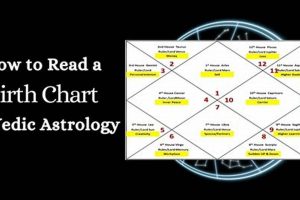A personalized document based on the principles of Jyotish, an ancient Indian system of astrology, provides insights into an individual’s personality, strengths, weaknesses, and potential life events based on planetary positions at the time of birth. This personalized document often includes analyses of various life aspects, such as career, relationships, finances, and health, offering guidance and predictions for the future.
Such analyses can offer individuals a deeper understanding of themselves and their life path. By providing potential challenges and opportunities, these documents can empower individuals to make informed decisions and navigate life with greater awareness. Rooted in a rich tradition dating back thousands of years, this practice continues to be a significant part of many cultures, offering a framework for self-discovery and life planning.
The following sections will explore the key components typically found within these personalized documents, delving into the intricacies of planetary influences and their interpretations. Further discussion will cover the practical applications of such an analysis and its potential impact on various life decisions.
Tips for Utilizing Astrological Insights
These personalized documents can offer valuable guidance. However, maximizing their potential requires careful consideration and application. The following tips provide practical advice for navigating and interpreting the information presented within these documents.
Tip 1: Approach interpretations with an open mind, but maintain a healthy skepticism. While these documents can provide valuable insights, they should not be taken as absolute predictions. Consider them as tools for self-reflection and potential guidance.
Tip 2: Focus on understanding the underlying planetary influences rather than solely on predictions. Grasping the significance of planetary placements can provide a broader understanding of one’s inherent tendencies and potential life patterns.
Tip 3: Consider consulting with a qualified astrologer for personalized guidance. An experienced practitioner can offer tailored interpretations and address specific questions or concerns.
Tip 4: Use the information to identify potential strengths and weaknesses. These documents can highlight areas for personal growth and development, enabling individuals to leverage their strengths and address their weaknesses effectively.
Tip 5: Integrate the insights into broader life planning. The information presented can be a valuable resource for making informed decisions regarding career, relationships, and other significant life choices.
Tip 6: Remember that free will plays a significant role. While planetary influences can offer guidance, individuals retain the power to shape their own destinies.
By integrating these tips, individuals can leverage the insights provided by these personalized documents to gain a deeper understanding of themselves and their life path, facilitating informed decision-making and personal growth.
The subsequent sections will explore frequently asked questions and additional resources for further exploration of this ancient practice.
1. Birth Chart Analysis
Birth chart analysis serves as the foundation of a Vedic astrology report. It provides a comprehensive snapshot of the celestial positions at the moment of birth, forming the basis for interpreting planetary influences and predicting potential life events. This analysis is crucial for understanding individual characteristics, strengths, weaknesses, and karmic predispositions.
- Planetary Positions:
Each planet occupies a specific sign and house within the birth chart. These placements signify the influence of that planet in different areas of life. For instance, the placement of Mercury reveals communication style and intellectual abilities, while Venus’s position signifies romantic inclinations and aesthetic preferences. Analyzing these positions is crucial for understanding an individual’s inherent traits and tendencies.
- House Significance:
The birth chart is divided into twelve houses, each representing a specific domain of life, such as career, finances, relationships, and health. The planets positioned within each house influence the corresponding area. For example, beneficial planets in the tenth house can indicate career success, while challenging placements in the seventh house might suggest relationship difficulties. Understanding house significance provides context for planetary influences.
- Planetary Aspects:
The angular relationships between planets in the birth chart are known as aspects. These aspects can be harmonious or challenging, further modifying the planetary influences. For instance, a harmonious aspect between Jupiter and Venus can indicate good fortune in relationships and finances, while a challenging aspect between Mars and Saturn might suggest obstacles and conflicts. Analyzing planetary aspects refines the understanding of planetary interactions.
- Nakshatras (Lunar Mansions):
The moon’s position within a specific Nakshatra, or lunar mansion, provides further nuances to personality and destiny. Each Nakshatra has unique characteristics and planetary rulers, offering insights into specific talents, motivations, and challenges. Incorporating Nakshatra analysis adds depth and precision to the birth chart interpretation.
By analyzing these facets within the birth chart, a Vedic astrology report provides a detailed and personalized roadmap of an individual’s life. This understanding empowers individuals to navigate their strengths, weaknesses, and potential life events with greater awareness, making informed decisions aligned with their unique astrological blueprint.
2. Planetary Placements
Planetary placements form the core of a Vedic astrology report, acting as the celestial blueprint upon which interpretations are based. These placements, determined by the precise positions of planets at the time of birth, are not merely arbitrary points in space but signify specific influences and energies that shape an individual’s personality, tendencies, and potential life experiences. The placement of each planet within a particular zodiac sign and astrological house carries specific meaning. For instance, a Mars placement in Aries might indicate assertiveness and dynamism, while a Venus placement in Libra could suggest a predisposition towards harmony and balance. Understanding these placements provides a framework for interpreting inherent strengths, weaknesses, and karmic predispositions.
The significance of planetary placements extends beyond individual characteristics. They also play a crucial role in understanding potential life events and patterns. The interplay between planetary positions creates specific configurations and aspects, which can signify opportunities, challenges, and turning points in life. For example, a conjunction of Jupiter and Mercury might indicate intellectual prowess and good fortune in communication-related fields, while a challenging aspect between Saturn and Mars could suggest obstacles and conflicts. By analyzing these planetary interactions, a Vedic astrology report offers insights into potential life trajectories and areas of focus. Consider, for example, an individual with Saturn positioned in the tenth house of career. This placement often signifies a strong work ethic and potential for success in fields requiring discipline and perseverance. However, it might also indicate delays and challenges in career progression.
A comprehensive understanding of planetary placements within a Vedic astrology report empowers individuals to navigate their life paths with greater awareness. It provides a framework for understanding inherent strengths and weaknesses, anticipating potential challenges, and capitalizing on opportunities for growth. Recognizing the influence of planetary placements allows individuals to make informed decisions aligned with their unique astrological blueprint, fostering self-awareness and maximizing their potential for fulfillment. This understanding, however, requires careful consideration of the entire birth chart, as individual planetary placements should be interpreted within the context of the overall astrological landscape.
3. Dasha Predictions
Dasha predictions constitute a cornerstone of Vedic astrology reports, providing a dynamic framework for understanding the unfolding of karmic influences over time. Unlike static birth chart analysis, which offers a snapshot of planetary placements at birth, Dasha predictions reveal the timing and nature of planetary periods, offering insights into specific life phases and their potential impact. These predictions are essential for understanding the ebb and flow of opportunities and challenges throughout an individual’s life.
- Planetary Periods:
Dashas represent specific planetary periods, each ruled by a particular planet and varying in duration. These periods signify the dominant planetary influence during that timeframe, shaping experiences and events. For instance, a Jupiter Dasha often signifies a period of growth, expansion, and good fortune, while a Saturn Dasha may bring about challenges, lessons, and a focus on discipline. Understanding the current planetary period provides context for present circumstances and potential future trends.
- Sub-Periods (Bhuktis and Antaras):
Within each major planetary period (Dasha), there are sub-periods known as Bhuktis and Antaras, ruled by other planets. These sub-periods further refine the Dasha’s influence, adding layers of nuance and complexity. For example, a benefic sub-period within a challenging Dasha can offer respite and opportunities amidst difficulties, while a challenging sub-period within a benefic Dasha might bring temporary setbacks. Analyzing these sub-periods provides a more granular understanding of specific life phases.
- Predictive Techniques:
Various predictive techniques are employed in conjunction with Dasha analysis to forecast specific events. These techniques consider planetary transits, aspects, and other astrological factors in relation to the ongoing Dasha and its sub-periods. For example, a transit of Jupiter over a natal planet during a Jupiter Dasha can amplify the positive influences of that Dasha. Integrating these predictive techniques enhances the accuracy and detail of the forecast.
- Remedial Measures:
Dasha predictions often include recommendations for remedial measures to mitigate potential negative influences during challenging planetary periods. These remedies may include specific mantras, gemstone recommendations, charitable acts, or lifestyle adjustments. For instance, during a challenging Saturn Dasha, remedies might focus on cultivating patience, discipline, and acts of service. Incorporating these remedies can help navigate difficult periods with greater ease and resilience.
By integrating Dasha predictions, Vedic astrology reports offer a dynamic and personalized roadmap for navigating life’s journey. Understanding the timing and nature of planetary periods empowers individuals to anticipate potential challenges, capitalize on opportunities, and make informed decisions aligned with their evolving karmic landscape. This understanding provides a framework for personal growth, self-awareness, and informed life planning.
4. Remedial Measures
Remedial measures constitute an integral component of a Vedic astrology report, offering practical strategies to mitigate potential negative influences and enhance positive planetary energies. These measures, often derived from ancient Vedic traditions, aim to address specific planetary imbalances or challenging astrological configurations identified within the birth chart and Dasha predictions. They provide a proactive approach to navigating life’s challenges and maximizing opportunities for growth and well-being.
The connection between remedial measures and the Vedic astrology report lies in the cause-and-effect relationship between planetary influences and life experiences. A Vedic astrology report identifies potential challenges and opportunities based on planetary placements and periods. Remedial measures, in turn, offer targeted solutions to address these specific astrological influences. For instance, a report might reveal a challenging Saturn placement, indicating potential obstacles and delays in career or personal life. Corresponding remedial measures could involve specific practices like chanting Saturn mantras, fasting on Saturdays, or performing acts of service to mitigate these difficulties.
Consider the example of an individual experiencing a challenging period related to finances, indicated by a difficult placement of Venus in their birth chart or a challenging Venus Dasha. Remedial measures might include chanting specific mantras associated with Venus, wearing gemstones associated with Venus, or performing charitable acts related to women or the arts, domains governed by Venus. These measures aim to strengthen Venus’s positive influence and mitigate the financial challenges indicated in the report.
The practical significance of understanding and applying remedial measures lies in their potential to empower individuals to navigate life’s challenges with greater resilience and proactively shape their destinies. While a Vedic astrology report provides insights into potential life patterns, remedial measures offer tools to mitigate negative influences and enhance positive ones. This understanding underscores the proactive nature of Vedic astrology, emphasizing the potential for individuals to actively participate in shaping their lives rather than passively accepting predetermined outcomes. It is important to note that remedial measures are not a guaranteed solution to all problems, but rather supportive practices to navigate life’s complexities with greater awareness and agency.
5. Personalized Insights
Personalized insights constitute a crucial element of a Vedic astrology report, distinguishing it from generalized astrological readings. These insights move beyond generic planetary interpretations to offer tailored guidance based on an individual’s unique birth chart. This personalized approach provides a deeper understanding of one’s inherent strengths, weaknesses, karmic predispositions, and potential life path, facilitating self-awareness and informed decision-making.
- Strengths and Weaknesses:
A Vedic astrology report identifies specific strengths and weaknesses based on planetary placements and aspects. For example, a well-placed Jupiter might indicate optimism and generosity as strengths, while a debilitated Saturn could suggest pessimism or a tendency towards procrastination as a weakness. Recognizing these inherent traits empowers individuals to leverage their strengths and address their weaknesses effectively.
- Karmic Predispositions:
Vedic astrology acknowledges the influence of past karma on present life circumstances. A Vedic astrology report can offer insights into karmic patterns and lessons that may manifest in an individual’s life. For example, a challenging placement of Rahu (North Node) might suggest karmic debts related to certain areas of life. Understanding these karmic influences can facilitate personal growth and spiritual development.
- Relationship Compatibility:
Vedic astrology offers tools to assess relationship compatibility based on birth chart comparisons. A report can highlight potential areas of harmony and conflict within interpersonal relationships, providing insights for navigating relationship dynamics effectively. For instance, analyzing the interaction between Venus and Mars in two individuals’ birth charts can offer insights into their romantic compatibility.
- Career Guidance:
A Vedic astrology report can provide valuable career guidance by analyzing planetary placements related to profession and vocation. The position of the tenth house lord, Saturn’s influence, and other relevant planetary aspects can offer insights into suitable career paths and potential for professional success. For example, a strong influence of Mercury might suggest aptitude for communication-related fields, while a prominent Mars placement could indicate suitability for careers requiring leadership and initiative.
These personalized insights, derived from a comprehensive analysis of an individual’s birth chart, empower individuals to navigate life with greater awareness. By understanding their unique strengths, weaknesses, karmic influences, and potential life path, individuals can make informed decisions aligned with their astrological blueprint, fostering personal growth, self-discovery, and a deeper understanding of their place in the universe.
6. Life Path Guidance
Life path guidance forms a central pillar within a Vedic astrology report, offering a roadmap for navigating life’s journey based on planetary influences and karmic predispositions. This guidance goes beyond predicting specific events; it provides a framework for understanding the overarching themes and potential directions of an individual’s life. The connection between life path guidance and a Vedic astrology report arises from the premise that planetary positions at birth, along with subsequent planetary periods (Dashas), influence an individual’s tendencies, opportunities, and challenges. A Vedic astrology report analyzes these planetary influences to offer personalized insights into potential life paths. Cause and effect are central to this relationship: specific planetary placements and periods (causes) can manifest as particular life experiences and tendencies (effects). For example, a prominent Jupiter placement might lead to opportunities for higher education and spiritual growth, while a challenging Saturn period could manifest as obstacles and life lessons related to discipline and responsibility.
The importance of life path guidance as a component of a Vedic astrology report lies in its potential to empower individuals to make informed decisions aligned with their unique astrological blueprint. For instance, a report might reveal a strong predisposition towards a particular career path based on planetary placements in the tenth house. This insight can guide individuals towards pursuing professions aligned with their inherent strengths and potential. Consider an individual with a prominent Venus placement in their birth chart. A Vedic astrology report might suggest potential for success in artistic fields or careers related to beauty and aesthetics. This life path guidance empowers the individual to explore these areas, potentially leading to greater fulfillment and success. Conversely, understanding potential challenges indicated in the report, such as a difficult period related to health or relationships, allows individuals to proactively address these areas and make informed choices to mitigate potential difficulties.
A deep understanding of life path guidance within the context of a Vedic astrology report fosters self-awareness and facilitates informed life planning. It allows individuals to recognize their inherent strengths and weaknesses, anticipate potential opportunities and challenges, and make conscious choices aligned with their karmic predispositions and potential for growth. This understanding, however, necessitates acknowledging the complexities of life and the influence of free will. While a Vedic astrology report provides guidance, individuals retain agency in shaping their destinies. Life path guidance, therefore, should not be interpreted as a rigid prediction of future events, but rather as a valuable tool for self-discovery, informed decision-making, and navigating life’s journey with greater awareness and purpose.
Frequently Asked Questions about Vedic Astrology Reports
This section addresses common inquiries regarding Vedic astrology reports, aiming to clarify their purpose, interpretation, and practical applications.
Question 1: How does a Vedic astrology report differ from Western astrology reports?
Vedic astrology, also known as Jyotish, utilizes the sidereal zodiac, which is based on the fixed positions of constellations. Western astrology employs the tropical zodiac, which is based on the position of the sun relative to the earth. This fundamental difference in celestial referencing leads to variations in planetary placements and interpretations between the two systems. Vedic astrology also places greater emphasis on lunar mansions (Nakshatras) and planetary periods (Dashas) in its predictive techniques.
Question 2: What information is required to generate a Vedic astrology report?
Accurate birth data is essential. This includes the date, precise time, and place of birth. Accurate birth time is crucial as even slight variations can significantly alter planetary placements and subsequent interpretations.
Question 3: How should one interpret the predictions within a Vedic astrology report?
Predictions should be viewed as potential tendencies rather than fixed outcomes. Vedic astrology acknowledges the influence of free will and emphasizes the potential for individuals to make informed choices to navigate their lives. A Vedic astrology report offers guidance, not a predetermined script.
Question 4: Are remedial measures always necessary based on a Vedic astrology report?
Remedial measures are suggested based on specific planetary placements or periods that indicate potential challenges. While not obligatory, they are offered as tools to mitigate negative influences and enhance positive planetary energies. The decision to implement remedial measures rests with the individual.
Question 5: How often should one consult a Vedic astrology report?
The birth chart remains constant throughout life. However, consulting with a qualified Vedic astrologer for updated interpretations, especially during significant life transitions or when facing specific challenges, can provide valuable guidance. Regularly reviewing Dasha predictions can also offer insights into current and upcoming planetary influences.
Question 6: Can a Vedic astrology report predict the future with complete accuracy?
Vedic astrology does not claim to offer infallible predictions. It provides a framework for understanding potential life paths and karmic predispositions based on planetary influences. Free will, individual actions, and unforeseen circumstances play a significant role in shaping life experiences. Vedic astrology offers guidance, not definitive pronouncements of future events.
Understanding these key points empowers individuals to approach Vedic astrology reports with clarity and discern their practical application for self-awareness and informed decision-making.
The following section will explore additional resources and further avenues for exploring the intricacies of Vedic astrology.
Conclusion
Exploration of the personalized document derived from Vedic astrological principles reveals its multifaceted nature. Analysis of birth charts, planetary placements, Dasha predictions, and remedial measures provides a framework for understanding individual karmic predispositions and potential life paths. Personalized insights gleaned from these documents offer guidance for navigating life’s opportunities and challenges, empowering informed decision-making in various life domains, from career and relationships to personal growth and spiritual development. The dynamic interplay of planetary influences, as elucidated within these personalized analyses, underscores the interconnectedness of individual lives with the cosmos.
The enduring relevance of this ancient practice in contemporary life signifies a persistent human quest for self-understanding and a desire to navigate life’s complexities with greater awareness. Further exploration of the intricate principles underlying these personalized documents can provide valuable insights into the profound relationship between individual destinies and the celestial tapestry.







